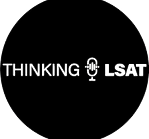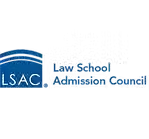The Law School Admission Test
(LSAT)
Everything You Need To Know!

THE LSAT
The Law School Admissions Test (LSAT) is administered by the Law School Admissions Council (LSAC). All information about the test’s format, important dates, and how to register can be found on their website – lsac.org. Applications to schools will also be submitted through lsac.org.
Students can take the LSAT up to 5 times, and there are multiple dates throughout the year that it is offered.
The test can be taken remotely or in person at a testing center. Regardless of location, the test is completed on a computer. Paper versions of the test are only available through accommodations.

LawHub
LSAC also runs a website called LawHub, which provides study resources for the LSAT as well as helpful information about schools. For example, this page provides employment data for every law school.
To access the entire database of past official tests, students will need to purchase a LawHub Advantage subscription ($120/year or free with a fee waiver). This subscription will also be required for any 3rd party test prep websites due to LSAC’s licensing requirements.



Fee Waivers
Low-income students can apply for a fee waiver through LSAC. The eligibility requirements can be found here. Anyone who thinks they have a chance at qualifying should apply. Students who get denied are allowed to appeal once, but no more than that, so it is recommended to provide as much documentation as possible on the first attempt. A fee waiver significantly reduces the costs associated with taking the LSAT and applying to law schools. Most test prep websites also offer significant discounts for students with a fee waiver.
Preparing for the LSAT
While it is possible to self-study for the LSAT, most students will utilize third-party services to help them prepare. Given that the majority of scholarships are merit-based, investing in preparation is highly recommended. Expect the process to take time and consistent effort. There are many different test prep companies to choose from. We suggest taking advantage of the free trials they offer to see which program provides the best fit for you.
There is a lot of information available about the LSAT and how best to study for it. Here are a few of the most important pieces of advice to remember:
Tips For the LSAT
1
Pace Preparation.
Don’t rush your preparation. It is common for students to study between 4-6 months, but many will take longer than that. If you are serious about law school, it is worth taking the time to prepare properly.
2
Set Targets.
Research the median scores of schools you're interested in, then set a target score above those medians. Commit to studying until you reach that.
3
Be Patient.
Don’t sign up until you are ready. If your practice scores do not reflect your goal, there is no reason to sign up for the official test. Continue practicing, and you will get there.
4
Test Readiness.
Don’t sign up until you are ready. If your practice scores do not reflect your goal, there is no reason to sign up for the official test. Continue practicing, and you will get there.
Lsat Partnerships

LSAT Demon Daily is another free podcast series from the founders of LSAT Demon. It can be found on thinkinglsat.com, Spotify, Apple Music, and Youtube. New episodes are released daily and cover LSAT and law school admissions—offering practical, actionable advice.

Thinking LSAT is a free podcast series from the founders of LSAT Demon. It can be found on thinkinglsat.com, Spotify, Apple Music, and Youtube. The series covers every LSAT and application-related topic imaginable.
.png)

